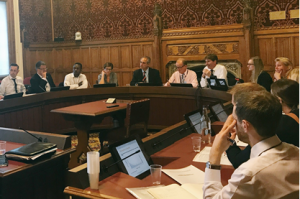
The Transparency Task Force (TTF) has published a report into Free-If-In-Credit personal current accounts and proposed a number of recommendations to improve transparency and clarity for account holders.
In response to the growing commentary about the lack of transparency around charges for Free-If-In-Credit accounts – which are 62% of all accounts – the TTF has presented a current account Standardisation Programme in order to reduce potential consumer confusion.
Last week in the Palace of Westminster, the leader of the Retail Banking Team of the TTF, Alex Letts, presented the report – the result of co-operation between industry bodies and extensive new research and analysis of previous studies – to an all-party parliamentary group of MPs and key figures within the retail banking industry (pictured above).
Alex said that since the event, he has had conversations with various senior bankers who saw standardisation as “inevitable”.
“There's a sense in the banking market that the regulator will make it more and more difficult for banks to make money in the way they have on current accounts, with an insistence on monthly charges being clearly displayed in the same way they are on credit card statements.
“They also anticipate a cap on monthly charges and the impression from people I've spoken to is that the TTF recommendations are a reflection of a consensus in the industry.”
[caption id="attachment_1411" align="alignnone" width="450"] Alex Letts presenting the TTF report at Westminster[/caption]
Alex Letts presenting the TTF report at Westminster[/caption]
What is included in the TTF's Standardisation Programme?
- Standardisation of terminology relating to account types so that consumers can easily compare accounts and their charges
- Standardisation of charging terminology so that consumers are clearer on what charges they may face
- Standardisation of charging rules so that consumers can understand more easily when they may incur charges
- Illustrative examples and average costs paid per account of consumers holding an account so that consumers can easily identify the costs of the financial product they hold or are considering.
“Transparency means both clarity around up-front fees and a consistent way of presenting them, so a customer can easily compare,” added Alex.
“The entire focus of my work with the Retail Banking Team of the TTF has been on clarity pricing and it remains our primary aim to ensure our recommendations are put forward.
“This is a significant challenge in itself and my efforts will stay in this area until we can say we have an outcome we're satisfied with.”
Will the Standardisation Programme be adopted by specialist banks too?
“In terms of charging, those accounts that are directly taking on the banks don't appear to be any more or less opaque than the incumbents; making money through lending with lower interest rates and costs that make it feasible.
“Where the model of those challengers directly taking on the banks does seem to differ is that they don't appear to be adding in extra charges or fees at all for current account usage, irrespective of the idea of transparency.
“The model may be different, but you'd hope to see them giving any charges or fees full visibility, in line with our proposals.”
Who is the Transparency Task Force?
The TTF is a campaigning community, dedicated to driving up the levels of transparency in financial services around the world.
Its Retail Banking Team is led by Alex Letts, co-founder and 'chief unbanking officer' at U and Heather Buchanan, director of policy at the All-Party Parliamentary Group on Fairer Business Banking.
-
Temenos partners with ClearBank for cloud payments
Banking software company Temenos has formed a strategic relationship with ClearBank to provide banks with a faster route to market for real-time cloud payments...
-
Unity Trust Bank registers 34% rise in profits
Unity Trust Bank increased profits by 34% in 2019...
-
Believe the hype – why explainable AI is a trend that’s here to stay
Technology has become a ubiquitous part of our day-to-day lives...
-
Piloting tech updates: ‘The bigger the bank, the harder it is to get anything done’
In the latest Medianett filmed roundtable session, we discussed how important technology is in the banking space, and what impact the industry expects it to have on its businesses in the future...
-
What banks need to know about cloud security
One of the most common perceived concerns when adopting the cloud is the issue of security...
-
OakNorth sees 95% increase in pre-tax profits
OakNorth Bank has announced a 95% rise in pre-tax profits in 2019 to £65.9m, up from the £33.9m recorded in 2018...
-
Redwood Bank signs up to Women in Finance Charter
Redwood Bank has announced that it has signed up to the Women in Finance (WIF) Charter...
-
Masthaven launches digital Women in Leadership programme
Masthaven Bank has launched a new Women in Leadership digital development programme for female senior leaders...
-
Protecting against supply chain disruption and the domino effect
Disappointingly, many UK SME business owners don’t understand their supply chains...
-
Confused about which Isa to choose? Hopefully this mini-guide will help…
We are now firmly in Isa season, so you’re likely to read multiple articles about the most competitive Isa products in the market and how best to make the most of your Isa allowance before the end of the tax year...
-
Garden shed entrepreneurs contribute £16.6bn to the UK economy
Entrepreneurs who run their businesses from garden sheds contribute £16.6bn annually to the UK economy, according to a recent study...



